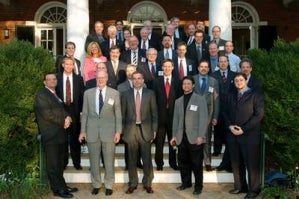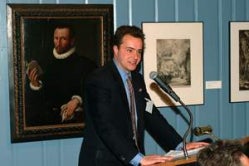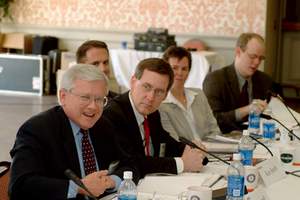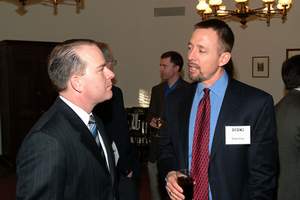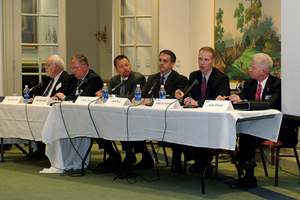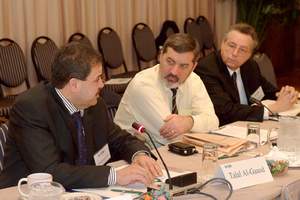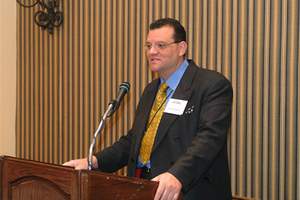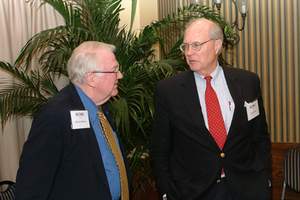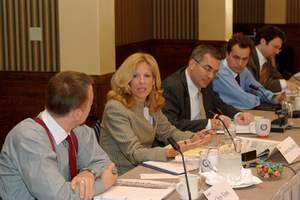Spring 2005 Conference
Hostage to Terrorism: Governmental and Non-Governmental Response Strategies
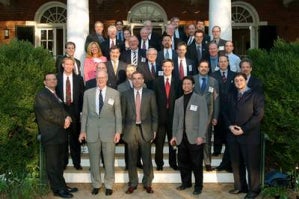
Conference Description
University of Virginia
Charlottesville, VA
April 3 to April 5, 2005
In May 2004, Nick Berg, an American businessman, was taken hostage and executed by Islamic extremists operating in Iraq. Berg’s ordeal was the first of many such hostage events to play out in Iraq in 2004. The events were often broadcast internationally via the internet and other media outlets. Officials in Iraq, including American FBI agents from the Crisis Negotiation Unit, wrestled with the best strategies to deal with the events. The Critical Incident Analysis Group studied these events and strategies at its yearly conference held in Charlottesville, Virginia.
Conference Highlights
Distinguished Guests
- Talal B Meajl Al-Gaaod – is a native of Iraq, in the Al Anbar province. He is involved in restructuring new companies and projects to serve the new Iraq, as well as building strategic partnerships in Jordan, Lebanon, and the UAE with new development projects and investments.
- Scott Atran – is a research director at the National Center for Scientific Research in Paris, France. He is also a research scientist at the University of Michigan Institute for Social Research (ISR) and an adjunct professor in the U-M departments of anthropology, psychology and natural resources and environment.
- Johanna Drucker – Robertson Professor of Media Studies, joined the faculty at the University of Virginia in 1999. Her expertise in media draws on theories of communication and visual representation. She has taught documentary film and analysis as well as the reading of graphical features of media. Her current research in digital humanities includes work on the history and development of visual forms of knowledge production for the humanities.
- Fred Hitz – is the former inspector general of the CIA, appointed by the President in 1990. His experience includes serving as a congressional relations officer, deputy assistant secretary of defense for legislative affairs, a senior staff member of the Energy Policy and Planning Staff in the Executive Office of the President, and director of congressional affairs at the Department of Energy.
- Anita Jones – is a Professor of Computer Science in the School of Engineering and Applied Science, previously having served as chair of the Department of Computer Science. Professor Jones was sworn in as the Director of Defense Research and Engineering for the U.S. Department of Defense in June 1993. In that position she was responsible for the management of the science and technology program.
- David Kestenbaum – is the science correspondent for National Public Radio(NPR). A Ph.D. physicist from Yale, Mr. Kestenbaum has a particular interest in the intersection of government and science.
- Ken Smith – is senior vice president of the Government Group of Fluor Corporation. Mr. Smith is responsible for the group that provides services to the US Federal Government and select foreign governments. This includes business with the Departments of Defense, Energy, State, Labor and Homeland Security, as well as various other federal agencies, including supporting the US Government’s rapid response capabilities to address the country’s security issues and disaster relief efforts.
- Eric K. Stern – is Associate Professor of Government at Uppsala University. He is Director of the Center for Crisis Management Research and Training (CRISMART) and acting Professor at the Swedish National Defense College in Stockholm and senior research fellow at the Swedish Institute of International Affairs. He has published extensively in the fields of crisis management, security studies, foreign policy analysis and political psychology.
- Reverand Canon Andrew White – serves as the Archbishop of Canterbury’s Special Representative to the Middle East, and continues to co-ordinate the religious track of the Middle East peace process – known as the Alexandria Process.
Key Panels and Discussions
A case presentation involving hostage-taking was followed by discussion. Subsequent panels focused on historic considerations (Munich’s legacy), the methodology of hostage-taking forms of terrorism, resilience building and a new paradigm for adjudication of these types of cases. The human costs of hostage taking were also examined, including the ethical, moral and emotional toll. In order to examine the complexities of hostage-taking in the current war on terrorism, panelists relied on insights from professionals within government, academe and the private sector.
Representative Insights
“We can no more say ‘the media’ in talking about the war on terror than we can reduce either war or terror to a single unified concept.” – Johanna Drucker Ph.D.
“There is very often a disconnect that’s not anybody’s fault. It’s just a product of structures between the people who are on the ground doing things and the people who are in a different place in a bureaucracy deciding policy.” – George Terwilliger
“Regarding the concept of negotiation – I haven’t found a definition in a dictionary, a current American dictionary, that I’m comfortable with because there’s always the word “compromise.” From our perspective, we’re so goal-oriented; we don’t compromise. If there are four hostages, we’re not willing to compromise and accept two ultimately.” – Chris Voss, FBI
“[Hostage takers] are very sophisticated…they read the press more than we do, and that’s where they feed. The environment there is extremely dynamic. They’ll claim to be insurgents even when they’re not insurgents. Often times the merely criminal elements will cast themselves in sort of a cloak of what they feel is legitimacy, which is that they’re acting as part of the insurgency.” – Eric Rye, U.S. Dept. of State
“[While hostages are held] the president is in a very tough position, because on the one hand he doesn’t want to appear insensitive, and you have this incessant media request for, how do you feel about this, every time he walks across the lawn with a helicopter or is in a meeting with a foreign leader, whatever it happens to be. So he can’t really dodge that. On the other hand, you don’t want to make this any more important because this is, as we talked about this morning, many times counter productive. So it puts him in a very difficult spot.” – Edwin Meese III
“Now, one observation I’d make about all terrorists, including the one in Ireland was, it went through phases, and some tactics just disappeared because they didn’t appear to be terribly effective. People got tired of them. Once you’ve taken and beheaded a hundred hostages, nobody remembers the 101st or 105th. So I’m not at all sure in ten years time we’ll be talking about hostage taking because I think these things tend to come and go anyway.” – Lord John Alderdice
Images
- 2005 CIAG Conference Participants
- Frank Cilluffo introducing the opening evening’s keynote speaker, Scott Atran.
- Mike Becraft discussing ‘Immigration and its Discontents.’ Ken Smith looking on.
- Chris Voss talking with John Noftsinger.
- The opening panel of the 2005 CIAG conference – Hostage Taking Case Presentation and Discussion.
- Eric Stern posing a question to the panel.
- Mr. Talal Al-Gaaod of Iraq discussing his country. Lord John Alderdice and Dean Johnston looking on.
- Reverand Canon Andrew White presenting during lunch on “Faith and Fear: Religion’s Role.”
- The Honorable Ed Meese and Jerry Jones discussing the conference.
- Suzanne Spaulding providing closing remarks during final panel of the conference.

